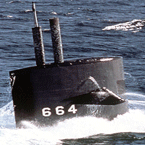Alfred
Posts: 6685
Joined: 9/28/2006
Status: offline

|
There are pros and cons for both positions but on balance, there is more substance to HansBolter's position than for the opposite position.
1. For all it's abstractions, AE remains a game very firmly designed with historical capabilities as the guiding philosophy.
2. No private mod has totally disregarded historical capabilities In all instances the private modder has designed a mod consistent with what they think is the historical capabilities available within the parameters of their mod.
3. Occasionally AE design criticism made by players is directed towards a perceived level of unnecessary micro management. More often it is directed towards a perceived poor representation of historical capabilities. No one has ever argued for the use of this engine to represent 2019 capabilities; no request for the modern Soryu class of subs to be in the OOB, no request for the CVN class, no Apache helicopters, no Abrams tanks. Fidelity to the 1941-46 period is the only demand consistently made.
The only possible conclusion from the above three points is that the purchasers of AE only want a product consistent with the historical capabilities of the PTO of WWII. Otherwise they would play Harpoon, or HOI, or the Naval Sims ship construction game or any of the other myriad wargames available in the market place.
4. This game is asymmetrical. Just as the real war was. However it is precisely the victory conditions which provide the Japanese player with a real opportunity to win the game, and force the Allied player to perform at least as well as the historical Allied commanders to achieve the historical decisive victory. I for one have no patience with all those PBEM players, from both sides, who shout from the roof that they are only interested in the journey, not the game's victory conditions and yet without any evidence of embarrassment proceed to demand conditions or house rules whose only impact is to make their play more competitive all whilst simultaneously decrying any action taken by their opponent which is not consistent with the historical record. That sure isn't any journey which would be recognisable by the real participants of the historical conflict. It is intellectual dishonesty of the highest order to claim to desire a journey along historical capabilities (else points 1-3 above inclusive would not be the case) but then demand changes away from the historical record. Were a non historically consistent journey experience really desired then one of the many other myriad wargames would be more suitable. No, this intellectual inconsistency is only rational when one understands that "pale face speaks with forked tongue"; irrespective of which side they play they expect to be able to attack and win.
5. Sure a single turn by itself doesn't amount to much in a game consisting of over 1600 turns. Yet there are so many players, overwhelmingly players who play the Japanese side who place so much weight on the parameters of turn 1. I speak from personal experience of individuals who will only play if on turn one they can attack the Saratoga in port, plus land at Mersing, plus hit the port of Manila, plus have "Surprise On", plus no Allied TFs to be created, plus no rerouting of Force Z; all on the basis that otherwise there is no point in playing Japan. So much for playing to go on the journey because Japan can't win, so much for a single turn not being that important because it is the journey which counts. Yes, "pale face does indeed speak with forked tongue", especially when point six below is factored in.
6. It is a fact that the selection of all game conditions are there to be negotiated by the two PBEM players. The more closely tied to historical capabilities it is desired the game play should be, the more those historical conditions should be selected. For each non historical condition selected, the game design balance is altered. Give the Allied player unhistorical torpedo dud rates, the Japanese player will not experience a historical journey and is morally entitled to some non historical compensation. Remove the historical Allied damage control and the Allied player will not experience a historical journey and is morally entitled to some non historical compensation. When a Japanese player demands both a non historical first move plus Surprise On, the opening war salvo is not experienced and consequently the Allied player is morally entitled to some other non historical compensation.
7. Too many Allied PBEM players are bluffed into believing that they have to accommodate JFB demands. The fact is that JFB PBEM players equally need Allied players to tango. Very few Japanese players are willing to play the Allied side in a PBEM. Too few Japanese PBEM players really understand the secret to really enjoying their side is to play for the victory conditions and thereby rejoice in small "victories" which hinder their opponent's march to a decisive victory, and in the process enjoy the journey. No the majority of Japanese players believe they have the ability to correct the historical Japanese "errors" and without an Allied opponent they cannot demonstrate their perceived skill. It is simply not true that there are so few players willing to play Japan in a PBEM that an Allied player must grovel to obtain any PBEM opponent.
Alfred
|
 Printable Version
Printable Version





















 New Messages
New Messages No New Messages
No New Messages Hot Topic w/ New Messages
Hot Topic w/ New Messages Hot Topic w/o New Messages
Hot Topic w/o New Messages Locked w/ New Messages
Locked w/ New Messages Locked w/o New Messages
Locked w/o New Messages Post New Thread
Post New Thread